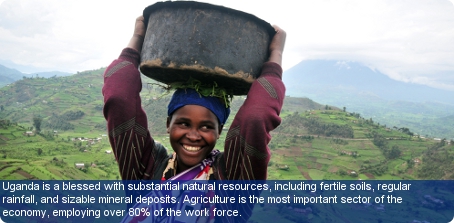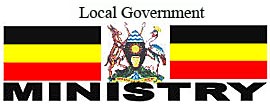Find a business in Uganda

The landlocked country of Uganda is blessed with substantial natural resources including fertile soils, regular rainfall, and sizable mineral deposits of copper and cobalt. With over 80% of the work force involved in agriculture, this is the most important sector in the economy. Uganda has a GNI per capita of US$500 (2010) but has seen strong growth of 8.1% per annum (2006-10). The discovery of sizeable oil reserves suggests that the strong growth will continue and the economy will become less concentrated on its traditional agriculture roots.
Agriculture is the most important sector of the economy, employing over 80% of the work force and the combined agriculture, forestry and fisheries sectors contribute 23% of Uganda’s GDP (2010). Agricultural products are the major export group and make up nearly all of Uganda’s foreign exchange earnings. Uganda is Africa’s leading producer of coffee, which accounts for the bulk of the country’s exports. All the fish caught is freshwater, since the country is landlocked. Fisheries currently rank as the leading non-traditional agricultural export earner.
Uganda, along with Ghana and Namibia, is one of Africa’s upcoming oil producing nations. There are 1 billion barrels of proven oil reserves and 14.16 billion cubic metres of proven natural gas reserves (1 January, 2011). Apart from oil and gas, Gold is the leading mineral export and much of the gold comes from alluvial deposits around the Buhweju Plateau, recovered by artisanal miners.
Construction is a comparatively large economic sector in Uganda, accounting for 11% of GDP. There are hundreds of small companies in the private sector and some significant public sector involvement in the industry. The main drivers of demand in construction are residential homes and road building, as well as various other public sector projects. There are up to 1,000 engineers providing consulting solutions to Uganda’s construction, mechanised and electrical sectors.
Since 1986, the government, supported by donor countries and international agencies, has implemented policies in order to transform and stabilise the economy by undertaking currency reform, raising producer prices on export crops, increasing the prices of petroleum products and improving civil service wages. The policy changes are especially aimed at dampening inflation and boosting production and export earnings.
Roads are the most dominant mode of transport in Uganda, used by 90% of the country’s passenger and freight transport. Entebbe International Airport, 35 km south-west of Kampala, provides extensive regional and international services. The Uganda Railways Corporation operates a large cargo haulage concern in the country with a rail system totalling 1,300 km. It also operates three wagon ferries on Lake Victoria.
Uganda is ranked 48th in the world for getting credit, according to the World Bank’s ‘Doing Business 2012’ study of 183 countries. It is placed 12th in the sub-Saharan Africa region and 3rd in the region for resolving insolvency. These rankings measure the conduciveness of a regulatory regime in starting and operating a business.
Uganda has a 74% adult literacy rate. English is the official language, and is the language of instruction in schools, business, the court system, on national television and radio, and in all official documents.







